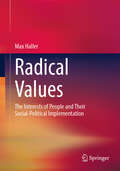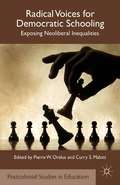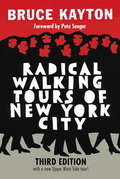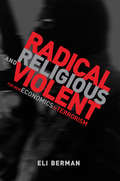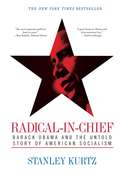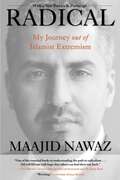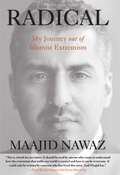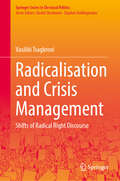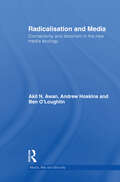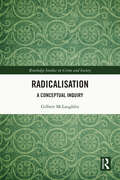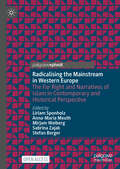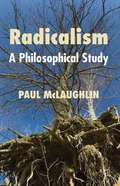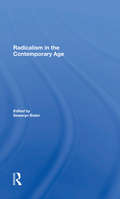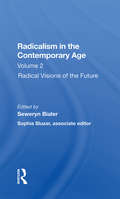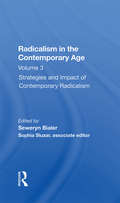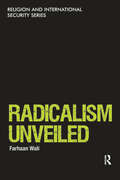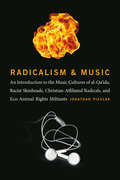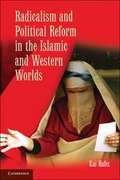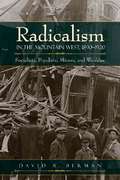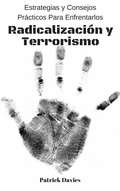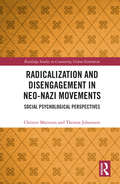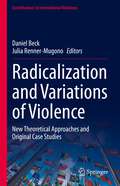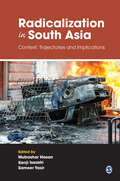- Table View
- List View
Radical Values: The Interests of People and Their Social-Political Implementation
by Max HallerA famous and frequently quoted sentence by Max Weber states: &“Interests, not ideas, directly govern the actions of people. However, the &‘worldviews&’ created by &‘ideas&’ have often determined the paths in which the dynamics of interests propelled action.&” Recent sociology, however, has not done justice to this principle. Values and their effects are either assumed to be given (as in the case of Talcott Parsons) or considered entirely irrelevant (as in Rational Choice and System Theory). Extensive empirical research on values has yielded many results but has largely lacked a theoretical foundation, making its findings often contestable. Weber himself provided only unsatisfactory answers regarding the relevance of values: The decision for specific values is a purely individual matter, and there is an irreconcilable struggle between different values. This book comprehensively examines this issue for the first time in sociology and finds a new, constructive, and explanatory solution - drawing on authors such as Immanuel Kant, George H. Mead, and Raymond Boudon. It is utilizing considerations from philosophy, social theory, and empirical social research, as well as incorporating historical struggles for the recognition and enforcement of values. It can be determined that there are fundamental societal values, that their number can be clearly defined, and that there is not necessarily conflict between them, but rather complementarity. With these theses and findings, this book can be regarded as a new sociological standard work. It is also of fundamental importance for students and researchers in many other humanities and social science disciplines.
Radical Voices for Democratic Schooling: Exposing Neoliberal Inequalities (Postcolonial Studies in Education)
by P. Orelus C. MalottComprised of in-depth interviews and conversations with key figures in education and activism that thoroughly examine the intersection of neoliberalism, neocolonialism, and racism, this first-rate collection critically explores, through their teaching, various, important issues situated in the context of Western neoliberalism and neocolonialism.
Radical Walking Tours of New York City, Third Edition
by Bruce KaytonToo often, tours of New York City are paeans to power--extolling the fabled New York skyline and the robber barrons whose wealth built it up, praising the marvels of a city built largely on finance. But New York has also, since its founding, been a city of struggle, a place where workers lived, created wealth, and spun out the rich cultural tapestry that has put the small island of Manhattan at the very center of the world's imagination. It is a city of proletarian uprising, of abolitionist rebellion, of civil rights demonstrations, and radical futures. This is Bruce Kayton's New York, the town of Emma Goldman and Langston Hughes, of Margaret Sanger and John Reed, of demonstrations and shootouts, of community gardens and marches. Now in an expanded third edition with a new Upper West Side tour featuring the Berrigans, Maxim Gorky, Lucien Carr and others, and updated sites reflecting recent anti-war and police-brutality protests, Occupy Wall Street and Zuccotti Park, and more, these thirteen walking tours, taking us from Battery Park to Harlem, from the Lower East Side to Central Park, offer a vital new perspective on the history of New York City and its place in the traditions of American radicalism.From the Trade Paperback edition.
Radical, Religious, and Violent: The New Economics of Terrorism
by Eli BermanApplying fresh tools from economics to explain puzzling behaviors of religious radicals: Muslim, Christian, and Jewish; violent and benign. How do radical religious sects run such deadly terrorist organizations? Hezbollah, Hamas, Lashkar-e-Taiba, and the Taliban all began as religious groups dedicated to piety and charity. Yet once they turned to violence, they became horribly potent, executing campaigns of terrorism deadlier than those of their secular rivals. In Radical, Religious, and Violent, Eli Berman approaches the question using the economics of organizations. He first dispels some myths: radical religious terrorists are not generally motivated by the promise of rewards in the afterlife (including the infamous seventy-two virgins) or even by religious ideas in general. He argues that these terrorists (even suicide terrorists) are best understood as rational altruists seeking to help their own communities. Yet despite the vast pool of potential recruits—young altruists who feel their communities are repressed or endangered—there are less than a dozen highly lethal terrorist organizations in the world capable of sustained and coordinated violence that threatens governments and makes hundreds of millions of civilians hesitate before boarding an airplane. What's special about these organizations, and why are most of their followers religious radicals? Drawing on parallel research on radical religious Jews, Christians, and Muslims, Berman shows that the most lethal terrorist groups have a common characteristic: their leaders have found a way to control defection. Hezbollah, Hamas, and the Taliban, for example, built loyalty and cohesion by means of mutual aid, weeding out “free riders” and producing a cadre of members they could rely on. The secret of their deadly effectiveness lies in their resilience and cohesion when incentives to defect are strong. These insights suggest that provision of basic social services by competent governments adds a critical, nonviolent component to counterterrorism strategies. It undermines the violent potential of radical religious organizations without disturbing free religious practice, being drawn into theological debates with Jihadists, or endangering civilians.
Radical-in-Chief: Barack Obama and the Untold Story of American Socialism
by Stanley KurtzPresident Barack Obama surprised many voters during a pre-election interview when he approvingly noted that Ronald Reagan had "changed the trajectory of America" in a way that other presidents had not. In effect, Obama was saying that he, too, aimed to transform America in some fundamental way. Yet while Americans in 1982 may have been divided over Reagan's politics, at least they knew what he stood for. Do we really understand Obama's vision for our country? In his controversial new book, veteran journalist Stanley Kurtz culls together two years of investigations from archives and never-before-tapped sources to present an exhaustively-researched exposÉ of President Obama's biggest secret--the socialist convictions and tactical ruthlessness he has long swept under the rug. A personable figure, a thoughtful politician, and an inspiring orator, Obama has hidden his core political beliefs from the American people--sometimes by directly misrepresenting his past and sometimes by omitting or parceling out damaging information to disguise its real importance. The president presents himself as a post-ideological pragmatist, yet his current policies grow directly from the nexus of socialist associates and theories that has shaped him throughout his adult life. Kurtz makes an in-depth exploration of the president's connections to radical groups such as ACORN, UNO of Chicago, the Midwest Academy, and the Socialist Scholars Conferences. He explains what modern "stealth" socialism is, how it has changed, and how it continues to influence the Democratic Party. He sheds light on what the New York Times called a "lost chapter" of the president's life--his years at Columbia--and proves that Obama's youthful infatuation with socialism was not just a phase. Those ideas have shaped his political views and set the groundwork for the long-term strategy of his administration. It could be argued that Obama's past no longer matters, but, in a sense, it matters more than the present. Obama has adopted the gradualist socialist strategy of his mentors, seeking to combine comprehensive government regulation of private businesses with a steadily enlarging public sector. Eventually, in his hands, capitalist America could resemble a socialist-inspired Scandinavian welfare state. The gap between inner conviction and public relations in Obama's case is vastly wider than for most American politicians. If Americans understood in 2008 the facts Kurtz reveals in this shocking political biography, Obama would not be president today. The fears of his harshest critics are justified: our Commander-in- Chief is a Radical-in-Chief.
Radical-in-Chief: Barack Obama and the Untold Story of American Socialism
by Stanley KurtzAn in-depth examination of President Barack Obama and his policies by journalist and political commentator Stanley Kurtz.
Radical: Fighting to Put Students First
by Michelle RheeIn Radical, Michelle Rhee, a fearless and pioneering advocate for education reform, draws on her own life story and delivers her plan for better American schools.Rhee’s goal is to ensure that laws, leaders, and policies are making students—not adults—our top priority, and she outlines concrete steps that will put us on a dramatically different course. Informing her critique are her extraordinary experiences in education: her years of teaching in inner-city Baltimore; her turbulent tenure as chancellor of the Washington, DC public schools; and her current role as CEO of the education nonprofit StudentsFirst. Rhee draws on dozens of compelling examples from schools she’s worked in and studied, from students who’ve left behind unspeakable home lives and thrived in the classroom to teachers whose groundbreaking methods have produced unprecedented leaps in student achievement.An incisive and intensely personal call-to-arms, Michelle Rhee’s Radical is required reading for anyone who seeks a guide to not only the improvement of our schools, but also a brighter future for America’s children.
Radical: My Journey out of Islamist Extremism
by Maajid NawazMaajid Nawaz spent his teenage years listening to American hip-hop and learning about the radical Islamist movement spreading throughout Europe and Asia in the 1980s and 90s. At 16, he was already a ranking member in Hizb ut-Tahrir, a London-based Islamist group. He quickly rose through the ranks to become a top recruiter, a charismatic spokesman for the cause of uniting Islam&’s political power across the world. Nawaz was setting up satellite groups in Pakistan, Denmark, and Egypt when he was rounded up in the aftermath of 9/11 along with many other radical Muslims. He was sent to an Egyptian prison where he was, fortuitously, jailed along with the assassins of Egyptian President Anwar Sadat. The 20 years in prison had changed the assassins&’ views on Islam and violence; Maajid went into prison preaching to them about the Islamist cause, but the lessons ended up going the other way. He came out of prison four years later completely changed, convinced that his entire belief system had been wrong, and determined to do something about it. He met with activists and heads of state, built a network, and started a foundation, Quilliam, funded by the British government, to combat the rising Islamist tide in Europe and elsewhere, using his intimate knowledge of recruitment tactics in order to reverse extremism and persuade Muslims that the &‘narrative&’ used to recruit them (that the West is evil and the cause of all of Muslim suffering), is false. Radical, first published in the UK, is a fascinating and important look into one man's journey out of extremism and into something else entirely.This U.S. edition contains a "Preface for US readers" and a new, updated epilogue.
Radical: My Journey out of Islamist Extremism
by Maajid NawazMaajid Nawaz spent his teenage years listening to American hip-hop and learning about the radical Islamist movement spreading throughout Europe and Asia in the 1980s and 90s. At 16, he was already a ranking member in Hizb ut-Tahrir, a London-based Islamist group. He quickly rose through the ranks to become a top recruiter, a charismatic spokesman for the cause of uniting Islam&’s political power across the world. Nawaz was setting up satellite groups in Pakistan, Denmark, and Egypt when he was rounded up in the aftermath of 9/11 along with many other radical Muslims. He was sent to an Egyptian prison where he was, fortuitously, jailed along with the assassins of Egyptian President Anwar Sadat. The 20 years in prison had changed the assassins&’ views on Islam and violence; Maajid went into prison preaching to them about the Islamist cause, but the lessons ended up going the other way. He came out of prison four years later completely changed, convinced that his entire belief system had been wrong, and determined to do something about it. He met with activists and heads of state, built a network, and started a foundation, Quilliam, funded by the British government, to combat the rising Islamist tide in Europe and elsewhere, using his intimate knowledge of recruitment tactics in order to reverse extremism and persuade Muslims that the &‘narrative&’ used to recruit them (that the West is evil and the cause of all of Muslim suffering), is false. Radical, first published in the UK, is a fascinating and important look into one man's journey out of extremism and into something else entirely.This U.S. edition contains a "Preface for US readers" and a new, updated epilogue.
Radicalisation and Crisis Management: Shifts of Radical Right Discourse (Springer Series in Electoral Politics)
by Vasiliki TsagkroniThis book discusses theories of crisis management and the radical right, to shed light on how responses to crisis influence radical right parties in their presence, discourse, and evolution. The book offers a comparative perspective by examining case studies with various traditions of radical right actors, presenting data on how crisis exploitation can assist in exploring, reconsidering, bargaining, and learning about the prospects of change of political parties. The book focuses on the debate on radicalization and crisis management. Similar to the already existing economic, political, post-Brexit, and migration crises in Europe, discourses of fear around the latest health crisis are paving the way for further radicalised discourse from the far right. The book looks into how radical right parties in Europe have responded to these crises. It monitors and explores how crisis exploitation impacts political strategies, opportunity-seeking behaviours, and the evolution of the discourse of radical right parties in the contemporary political landscape. Therefore, this book is a must-read for researchers, students, and policy-makers, interested in a better understanding of populism, radical right parties, electoral studies, as well as comparative politics in general.
Radicalisation and Media: Connectivity and Terrorism in the New Media Ecology (Media, War and Security)
by Andrew Hoskins Ben O'Loughlin Akil AwanThis book examines the circulation and effects of radical discourse by analysing the role of mass media coverage in promoting or hindering radicalisation and acts of political violence. There is a new environment of conflict in the post-9/11 age, in which there appears to be emerging threats to security and stability in the shape of individuals and groups holding or espousing radical views about religion, ideology, often represented in the media as oppositional to Western values. This book asks what, if anything is new about these radicalising discourses, how and why they relate to political acts of violence and terror, and what the role of the mass media is in promoting or hindering them. This includes exploring how the acts themselves and explanations for them on the web are picked up and represented in mainstream television news media or Big Media, through the journalistic and editorial uses of words, phrases, graphics, images, and videos. It analyses how interpretations of the term 'radicalisation' are shaped by news representations through investigating audience responses, understandings and misunderstandings. Transnational in scope, this book seeks to contribute to an understanding of the connectivity and relationships that make up the new media ecology, especially those that appear to transcend the local and the global, accelerate the dissemination of radicalising discourses, and amplify media/public fears of political violence. This book will be of interest to students of security studies, media studies, terrorism studies, political science and sociology.
Radicalisation: A Conceptual Inquiry (Routledge Studies in Crime and Society)
by Gilbert McLaughlinRadicalisation is a conceptual investigation within Western liberal democratic societies that follows an analytical framework linking expertise theory to discourse analysis of publications from the academic, governmental, and non-governmental spheres, as well as a dozen interviews with experts in the field. The reader will come to understand the socio-political configurations that led to the emergence of radicalisation as an object of study. The book also identifies the historical tensions regarding models, definitions, and operationalisation of the concept of radicalisation in social sciences research. Finally, a new model explaining how the term radicalisation became the central conceptual framework of a new field of expertise will be proposed. The book is situated within the fields of security studies, crime prevention, and sociology of expertise. The book is innovative in its distinct focus on the term radicalisation and the expertise thereof. With its diachronic and synthetical approach, the book also serves as an entry point for all researchers and practitioners seeking an introduction to the subject of radicalisation and violent extremism. The book addresses the debates among academics, public experts, and policymakers into the origin, dissemination, and maintenance of the field of expertise. Thus, the aim is not so much to uncover the 'true' meaning of the term as to understand how it has been socially constructed, this book will be of great interest to students and scholars of criminology, security studies, and sociology.
Radicalising the Mainstream in Western Europe: The Far Right and Narratives of Islam in Contemporary and Historical Perspective
by Stefan Berger Sabrina Zajak Liriam Sponholz Mirjam Weiberg Anna-Maria MeuthThis Open Access book offers a mixed-method approach to analysing anti-Muslim narratives in interactions between the far right and the Western European mainstream. By exploring narratives that portray Islam as inherently other, the essays in this collection interrogate the effects of such narratives on the targeted group and mainstream society. Authors explore mechanisms, such as historical othering, media agenda building, and online mobilization of the far right, and harness historical analysis, media content, social media network analyses and qualitative surveys, to propose that the effects of such media narratives are far from purely symbolic.
Radicalism
by Paul MclaughlinConfusion, controversy and even fear surrounds the political phenomenon of radicalism. This book attempts to make conceptual and historical sense of this phenomenon, both as a kind of practice and as a kind of thought, before defending it in a traditional if unfashionable form: a form that is historically progressive and politically humanistic.
Radicalism In The Contemporary Age, Volume 1: Sources Of Contemporary Radicalism
by Seweryn Bialer Sophia SluzarThis volume, Sources of Contemporary Radicalism, begins with Seweryn Bialer's examination of the definitional aspects of radicalism, as well as with the identification of specific contemporary sources of the radical impulse and the social groups that are the carriers of radicalism within society. In the next two chapters, Seymour Lipset and Stanley Rothman consider the case of the United States. Lipset asks anew the question posed by Werner Sombart at the beginning of this century: "Why is there no socialism in the United States?"From the perspective of a century of literature addressed to this question, he provides his own critique and explanation.Rothman considers the relatively new phenomenon of student radicalism in the United States, and, on the basis ofinterviews with student activists and results of tests they agreed to take, he offers hypotheses concerning their psychological motivation. Sidney Tarrow's chapter presents a comparisonand contrast of the societal sources contributing to the growth of radical movements in post-World War IIFrance and Italy. Henry Landsberger, in his chapter, concentrateson one societal group, the peasantry. Landsberger addresses the methodological issue that arises in defining peasant discontent as radicalism, and examines what it is that provides a "new" dimension to peasant discontent in modern times. In the final chapter, William Overholt presents a valuable interpretative survey of the literature on radicalism.
Radicalism In The Contemporary Age, Volume 2: Radical Visions Of The Future
by Seweryn Bialer Sophia SluzarTo understand contemporary society, it has become more and more essential to understand the phenomenon of radicalism—the aspirations of radical movements, the strategies and tactics of radicalism, and the impact of radicalism on contemporary society. Radicalism in the Contemporary Age grew out of the recognition of this need. A study in three volum
Radicalism In The Contemporary Age, Volume 3: Strategies And Impact Of Contemporary Radicalism
by Seweryn Bialer Sophia SluzarTo understand contemporary society, it has become more and more essential to understand the phenomenon of radicalism—the aspirations of radical movements, the strategies and tactics of radicalism, and the impact of radicalism on contemporary society. Radicalism in the Contemporary Age grew out of the recognition of this need. A study in three volum
Radicalism Unveiled (Religion and International Security)
by Farhaan WaliRadicalism Unveiled is an essential and unique contribution to our knowledge concerning the rise of Islamic radicalism in Britain. Through the study of Hizb ut-Tahrir (The Liberation Party), the spectre of radicalisation looms large and Muslim youth in Britain are increasingly linked to this group, making a critical examination of this complex phenomenon far overdue. Troubled by the great volume of disjointed theories put forward to provide an explanation for radicalisation, the author moves away from the preoccupation with working-class Muslims and considers the socio-political realities of this middle-class movement. An expanding movement inspiring Muslims in Britain to turn away from the bedrock principles of this country and infusing them with religious fanaticism. By penetrating the clandestine veil of Islamic radicalism, the book is able to interpret and analyse the closed social world of radical activism. Relatively unchallenged within British society, Radicalism Unveiled has one key purpose: to determine and explain why some young Muslims join Hizb ut-Tahrir.
Radicalism and Music: An Introduction to the Music Cultures of al-Qa’ida, Racist Skinheads, Christian-Affiliated Radicals, and Eco-Animal Rights Militants (Music Culture)
by Jonathan PieslakA comparative study of the music cultures of four radical groups
Radicalism and Political Reform in the Islamic and Western Worlds
by Kai Hafez Alex SkinnerOver the last decade, political Islam has been denounced in the Western media and in the surrounding literature as a terrorist or fascist movement that is entirely at odds with Western democratic ideology. Kai Hafez's book overturns these arguments, contending that, despite its excesses, as a radical form of political opposition the movement plays a central role in the processes of democratization and modernization, and that these processes have direct parallels in the history and politics of the West. By analyzing the evolution of Christian democratization through the upheavals of the Reformation, colonisation, fascism, and totalitarianism, the book shows how radicalism and violence were constant accompaniments to political change, and that these components - despite assertions to the contrary - are still part of Western political culture to this day. In this way, the book draws hopeful conclusions about the potential for political, religious, and cultural transformation in the Islamic world, which is already exemplified by the cases of Turkey, Indonesia, and many parts of South Asia. The book marks an important development in the study of radical movements and their contribution to political change.
Radicalism in the Mountain West, 1890-1920
by David R. BermanRadicalism in the Mountain West, 1890-1920 traces the history of radicalism in the Populist Party, Socialist Party, Western Federation of Miners, and Industrial Workers of the World in Arizona, Utah, Nevada, Idaho, Montana, Wyoming, Colorado, and New Mexico. Focusing on the populist and socialist movements, David R. Berman sheds light on American radicalism with this study of a region that epitomized its rise and fall. As the frontier industrialized, self-reliant pioneers and prospectors transformed into wage- laborers for major corporations with government, military, and church ties. Economically and politically stymied, westerners rallied around homegrown radicals such as William "Big Bill" Haywood and Vincent "the Saint" St. John and touring agitators such as Eugene Debs and Mary "Mother" Jones. Radicalism in the Mountain West tells how volleys of strikes, property damage, executions, and deportations ensued in the absence of negotiation. Drawing on years of archival research and diverse materials such as radical newspapers, reports filed by labor spies and government agents, and records of votes, subscriptions, and memberships, Berman offers Western historians and political scientists an unprecedented view into the region's radical past.
Radicalización y Terrorismo: Estrategias y Consejos Prácticos Para Enfrentarlos
by Patrick DaviesExiste un arsenal de tecnología avanzada disponible para la lucha contra el terrorismo. La desventaja, sin embargo, es que grupos terroristas como ISIS también tienen acceso a esos mismos recursos. Debido a su mayor maniobrabilidad y líneas de mando más cortas, las cartas se encuentran a su favor. Si pretendemos combatir el terrorismo, es importante establecer la definición de terrorista. No es un criminal "normal". Con frecuencia no persigue la obtención de ganancias financieras. Tampoco es un idealista "ordinario", que lucha pasivamente contra el orden establecido. Pero, ¿cuáles son sus motivos? La solidaridad desplegada todo el mundo después de algún terrible ataque resulta bella y conmovedora. Por otro lado, también escuchamos historias de musulmanes moderados que ahora son reprendidos, haciendo que aumenten las tensiones y los temores. Las personas nativas que se sienten inseguras se desplazan hacia posiciones políticas en blanco y negro. Las personas de entornos multiculturales que se sienten inseguras se aíslan dentro de su propio grupo cultural. En ambas situaciones, el 'nosotros' se coloca frente al 'ellos', creando caldos de cultivo para las ideas radicales. Las organizaciones terroristas están respondiendo a esto.
Radicalization and Disengagement in Neo-Nazi Movements: Social Psychology Perspective (Routledge Studies in Countering Violent Extremism)
by Thomas Johansson Christer MattssonThis book offers an in-depth study of personal accounts of men and women who have at one time entered, participated in and ultimately exited the neo-Nazi movement, with a focus on advanced Western states. Through detailed stories of the movement’s violence, hatred, and ideology, coupled with narratives of the individuals’ life plans and dreams when entering the movement and reintegrating into society, the work provides knowledge, hope and new directions for readers to better understand and react to a reinvigorated extreme right across Western nations. The book provides innovative research on the relationship between the life trajectories of neo-Nazis and their significant others, enabling better and more evidence-based strategies for preventing radicalization and promoting deradicalization. The extensive case studies include the voices of those who returned to the movement, or never left at all, providing a rare opportunity to compare active, former and returned right-wing extremists. The main contribution of the book is to provide an innovative approach to the oral history of young men and women who have participated in different national and local neo-Nazi movements in Western countries, namely Sweden and the United States. In order to understand the current trends within the movement and their relationship to the surrounding society, this shift calls for in-depth analyses based on social-psychological and sociological perspectives. Stressing the importance of having a gender theory, socio-cultural, historical, and both a national and contextual perspective on the neo-Nazi movement, this book contributes new knowledge to this field of research. This book will be of much interest to students of political extremism, radicalisation, terrorism studies and social psychology.
Radicalization and Variations of Violence: New Theoretical Approaches and Original Case Studies (Contributions to International Relations)
by Julia Renner-Mugono Daniel BeckThis book focusses on the interaction between different kinds of violence and radicalization. Current research criticizes linear models of radicalization and assumes that individuals are involved in radical actions even without extremist preferences. In recent years, the research on radicalization and the use of violence has increasingly been focused on this phenomenon of individual radicalization. However, radicalization is a manifold phenomenon on various levels and exists in miscellaneous variations.The book provides an impetus for analysing social situations that contain the potential for the emergence of conflict. This is done through new outlooks on the role of emotions, the influence of narratives and representations, the connection between (non)violence and emancipation and, lastly, new approaches and perspectives on deradicalization.
Radicalization in South Asia: Context, Trajectories and Implications
by Mubashar Hasan Kenji Isezaki Sameer YasirRadicalization in South Asia: Context, Trajectories and Implications presents a critical overview of radicalism, violence and terrorism in South Asia, a region that is diverse in terms of demography, religion, culture and political ideologies. While diversity could have worked as a push factor in strengthening democracies in the region, historically, fault lines in the South Asian faiths, culture, ethnicity, nationalism and political ideologies have triggered radical movements, and unleashed violence and terror attacks to destabilize democracies in the region. Against the backdrop of the current wave of illiberalism and radicalism sweeping over the US, Europe, Middle East, Australia and Latin America, this book presents the most recent scenario of the context, trajectories and policy implications for radicalism, violence and terrorism in five South Asian countries including India, Pakistan, Bangladesh, Sri Lanka and Maldives. It emphasizes the comparative insights provided by the changing values of South Asian society to offer a comprehensive picture of radicalization in this region.
